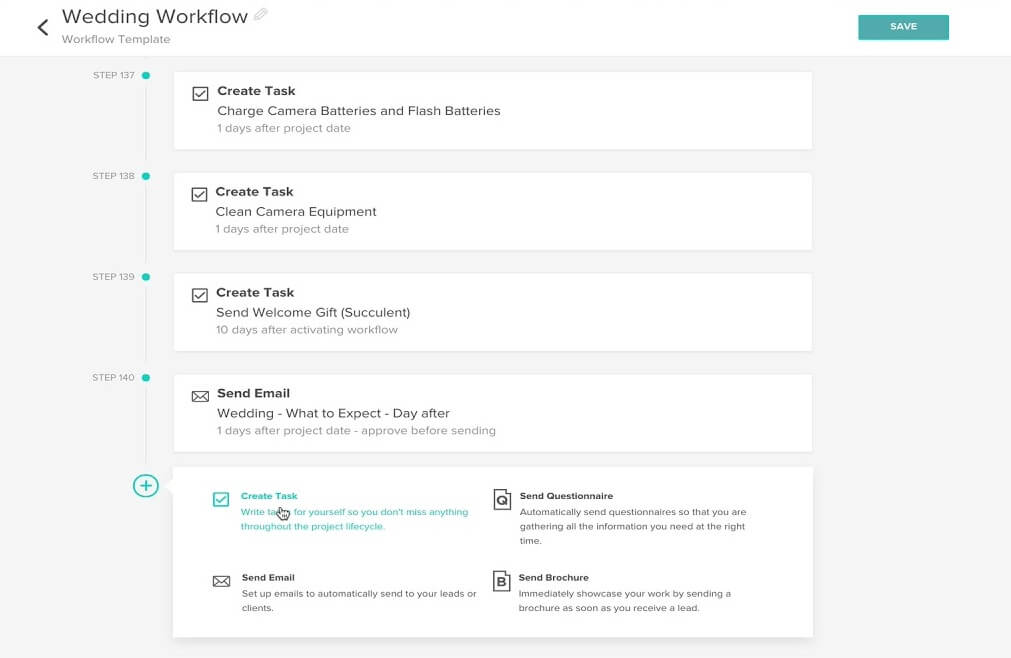Dubsado and HoneyBook are two of the more popular client management platforms around when it comes to drafting contract templates or submitting proposal templates. Pitched at the creative industry, they’re designed to simplify the business workflows, processes and reporting for graphic designers, writers, web developers, photographers, and more.
On this page, we examine Dubsado vs HoneyBook, look at features, and address their pros and cons.
Dubsado vs HoneyBook: features and cost
How do these client management software platforms stack up when we pit their features head-to-head?
So, clearly there’s not a lot to separate them when it comes to features and price. But what about the pros and cons of each client management platform?
The Pros of Dubsado
First off, let's dive into the pros.
1. It’s very customizable
Dubsado boasts a wide range of customizable options when it comes to the overall client-facing experience. This means the fonts, colors and images on forms, contracts, invoices and reports can be tweaked to reflect your brand’s look and feel.
You can also use custom CSS styling to embed media into forms such as proposals or questionnaires.

2. There’s integrated time-tracking
Some client management platforms (like HoneyBook) only allow for manual entries when it comes to time-tracking. Others, like Dubsado, build time-tracking into the software.
This means you don’t need to pay for and use a third-party time tracker over and above your subscription. Instead, you have confidence that the billable hours you’re tracking are fully integrated with your workflow and seamlessly applied to your invoice.

3. You can have multiple brands
If your creative business is split up into multiple brands (i.e. wedding photography and stationery) you can manage these brands within Dubsado while presenting them as separate to the outside world. It costs an additional $10 per brand, per month.
The cons of Dubsado
With so many features, Dubsado has a steep learning curve. Setting it up and tailoring it to your specific business needs and wants can be difficult and time-consuming, and many of its more complex features and functions can go unused while you get to grips with the basics.
The pros of HoneyBook
Now, taking further our Dubsado vs HoneyBook comparison, we observe the following looking at the latter.
1. It’s easy to set-up
In contrast with Dubsado, HoneyBook is a lot easier to use straight off the bat. You can have it up and running, just the way you want, in a few hours. Although it’s not as customizable as other client management platforms, all the basics are there, including template contracts and emails.
2. Simple workflows
Both HoneyBook and Dubsado allow you to build custom step-by-step workflows, guiding clients from the point of inquiry through to booking, onboarding, and payment.
The difference?
HoneyBook’s are so much simpler to set up and use. This level of task automation allows you to save time while presenting a polished and professional process to your client.

3. Built with events in mind
HoneyBook can be used by any number of creative professionals, but where it stands apart from Dubsado is as a platform for events.
Wedding planners, event managers, and photographers will appreciate the option to create a timeline covering pre-event organisation through to the day-of-event tasks and services.
The cons of HoneyBook
The biggest downside to HoneyBook is its lack of customization. Although recent changes have seen the introduction of certain custom options for forms, it pales in when comparing Dubsado vs HoneyBook.
HoneyBook is still well-designed, with a clean and clear interface, and it can be personalized up to a point. But if you’re looking for more control over your client management software’s output, it definitely falls short.
What’s the bottom line ?
When it comes to Dubsado vs HoneyBook, there’s no clear winner. The choice comes down to your industry, your expectations, and your desire for customization.
If you value a clean and simple design with easy-to-use functionality, HoneyBook could be the answer.
But if you want full control over how your brand is perceived from initial contact through to project completion, Dubsado gives you that option.
Bonsai: The real winning choice
Of course, there is another option. A client management software that’s designed to help you do more and work less from the get-go.
We're of course talking about Bonsai, which you can try out by signing up for a free trial.
Using deep integration and smart automation, we help you save valuable time and make sure you get paid. In other words, you focus on what you do best, and we’ll handle the rest.
1. Take your time back
Bonsai automatically creates and populates all of your documents as soon as you start a new project; no time-consuming data entry.
2. Protect your business
Bonsai keeps you covered with templated contracts and legally binding e-signatures.
3. Designed to be global
With international contracts and invoices, 180 currencies, and worldwide payments, there are no borders with Bonsai.
4. Get paid faster
Using Bonsai, freelancers are paid on average 13 days faster and have 3 times fewer late payments.






